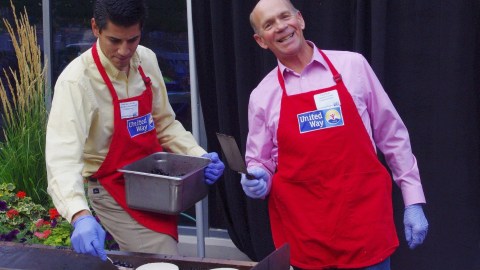Regular volunteering maintains the health of older adults

Pixabay
- A new study has confirmed that volunteering is good for your health.
- The researchers found that volunteering two hours a week reduced the risk of death in older adults.
- The test subjects also reported a greater sense of meaning, more optimism, and got more exercise.
A new study published in the American Journal of Preventive Medicine has confirmed that volunteering in your golden years is fantastic for your health. It goes further than previous studies and examines general well-being and specific dimensions of health to determine what volunteering can and cannot fix.
In line with previous studies, the researchers found that adults over 50 who volunteer at least 100 hours a year – a mere two hours a week – enjoyed a variety of mental health benefits.
People who volunteered at this level reported higher levels of optimism, positive affect, and a sense of meaning in their lives. They also reported fewer cases of depressive symptoms and loneliness. The data also showed these individuals had a lower risk of death or physically limiting impairments throughout the study.
Those who volunteered less saw reduced variations of these benefits, if any.
However, volunteering did not have much of an effect when it came to a variety of specific physical health outcomes including stroke, heart disease, arthritis, obesity, cognitive impairment, or chronic pain. While it was associated with more physical exercise, it did not affect rates of binge drinking, smoking, or sleep problems.
Frequent volunteers also reported little difference from non-volunteers on psychosocial outcomes such as life satisfaction, financial mastery, or depression.
This study was carried out, in part, to correct for the limitations of previous studies.
First of all, this study looked into reports on the well-being of a large number of nationally representative older adults. Many previous studies focused on younger people, small sample sizes, or groups that were not reflective of the general senior population. This study had a sample size of around 13,000 adults.
The researchers also paid attention to these people longer than previous efforts did. The data was collected three times over the course of eight years. Previous studies often stopped at the four-year mark. Those earlier studies also often failed to look closely enough to determine if the effect was causal, rather than correlational, for a variety of reasons. This time around, the study was structured to explicitly examine which of the previously noted health benefits were caused by time spent volunteering.
What most people get wrong about volunteering through work
The study found that the health benefits at 200+ hours of volunteering per year, about four hours a week, were very similar to the benefits of 100 hours per year. This is in line with previous studies suggesting that the 100-hour mark is a “threshold” point where the health benefits of volunteering fully manifest.
There are limits to this study that must be considered. Most of the data were self-reported and subject to self-report bias. It also focused purely on time spent volunteering and did not investigate the nature of that volunteer work. The authors suggest that future studies should look into how the quality of volunteer time, the motivations for volunteering, the kind of work being done, and other factors influence the results.
Despite these limits, the authors are enthusiastic about the potential applications of these findings.
They suggest that “The growing older adult population possesses a vast array of skills and experiences that can be leveraged for the greater good of society via volunteering. With further research, policies and interventions aimed at encouraging more volunteering it might be an innovative way of simultaneously enhancing society and fostering a trajectory of healthy aging (on some indicators) in the large and rapidly growing population of older adults.” They also suggest that one day doctors might suggest volunteering as a means to improve health outcomes.
That might be an excellent initiative to follow up on after this pandemic subsides. When that day comes, you can check out this list of available spots for volunteering. Options for volunteering virtually are also available.





